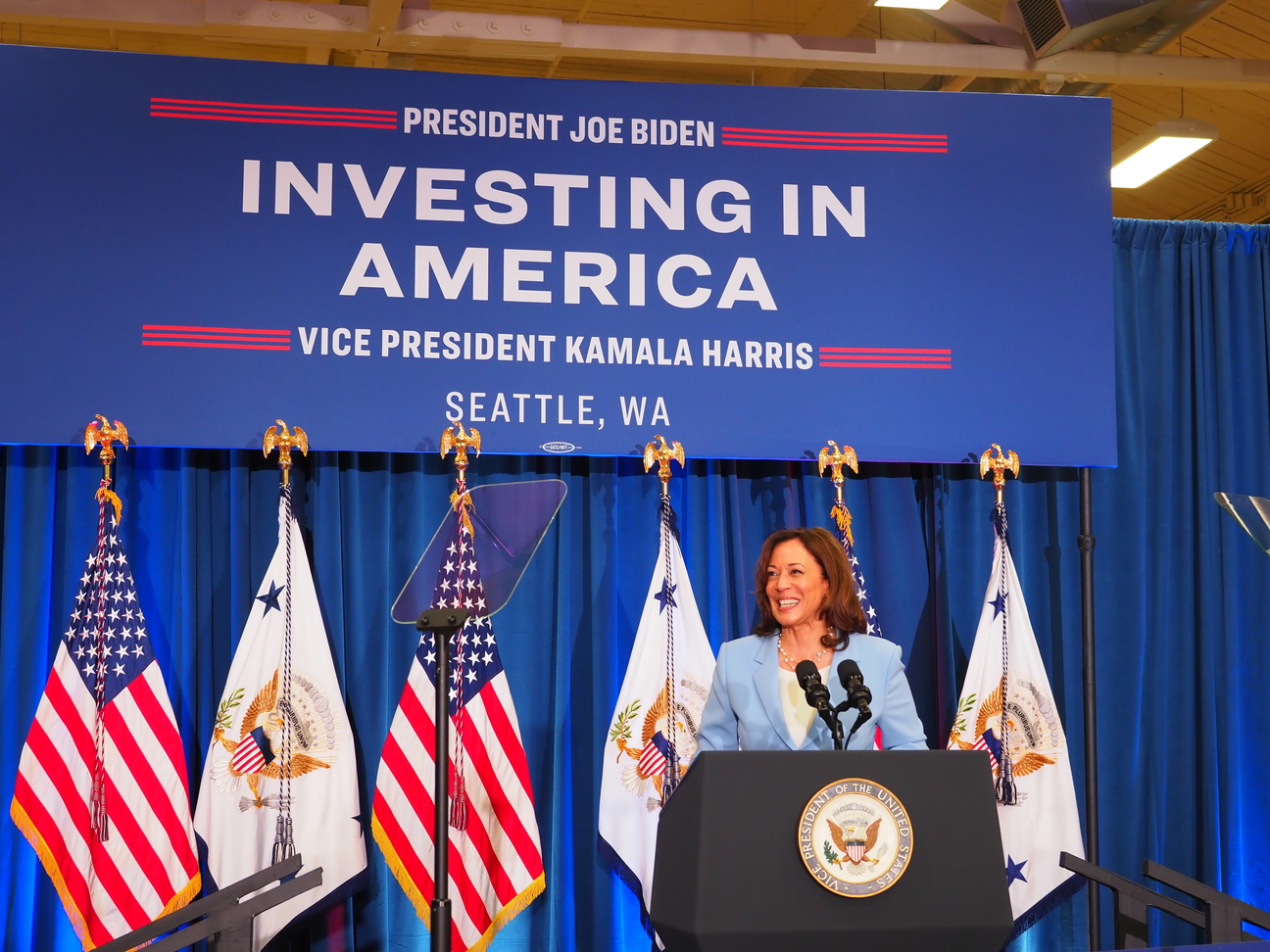Vice President Kamala Harris took the president’s chair in the U.S. Senate a year ago and cast the tie-breaking vote for what Harris described Tuesday as “the largest climate investment in American history.” All fifty Senate Republicans and all 207 House Republicans voted against the Inflation Reduction Act.
The vice president has taken to the road lately, celebrating the legislation, which commits $369 billion over a decade to funding and tax credits and clean energy technologies with the goal of reducing harmful emissions while increasing redeployment of the United States toward a future no longer beholden to the pollution belching fossil fuel economy.
The Inflation Reduction Act broke a decades-long impasse in committing the U.S. to reduce its carbon footprint, and fully engage a twenty-first century economy that moves away from the burning of coal, oil, and petroleum gas. It is the marquee achievement of the Biden-Harris administration.
The investment is coming none too soon. “It is clear the clock is not just ticking, it is banging,” Harris told a crowd at the McKinstry, a Seattle based firm which has been a national leader in energy-efficient building construction.

In a sweltering gym, on a day when Seattle’s temperature reached 94 degrees Fahrenheit, Harris spoke of a planet warming and suffering.
“Every day around the world, the impact of the climate crisis is stark and it is vivid,” said the veep, to a supportive crowd. She made note of parts of America “choked by drought, washed out by floods and decimated by hurricanes.”
The voice of Kamala Harris is increasingly heard these days.
For more than two years, she has been tied down in Washington, D.C., having to cast tie-breaking votes in the Senate, and becoming part of a close-knit Joe Biden operation that has worked together for more than forty years.
Harris is a former California attorney general and San Francisco prosecutor. She emerged during the Trump administration as a sharp, no-nonsense, take-no prisoners interrogator of the former president’s frequently unqualified and clueless appointees.
The Seattle visit, which consisted of stops touting the Inflation Reduction Act and headlining a pricey Democratic fundraiser in Medina, brought Harris together with an equally no-nonsense former Senate colleague – Senator Maria Cantwell.
Cantwell has touted the economics of a clean energy economy. She was first to point out, after trips to China early in this century, that the Chinese were forging ahead in such fields as solar panels and wind power.

She argued that the United States had an opportunity to do good for the planet, and its own economy. She fought for tax advantages of utilities investing in wind power, and spoke out in frustration when turbines for wind farms in Central Washington came from Denmark and Germany.
The Inflation Reduction Act has changed all that. “The IRA is ten years of predictable investment so that companies like McKinstry and others can do the innovation that is going to give consumers a choice,” Cantwell said.
Harris has just recently been to Dalton, Georgia, and visited a solar panel manufacturer that will be employing 2,500 people.
All told, she added, “175,000 new clean energy jobs” have flowed from that tie-breaking Senate vote last year. Touching on another long-time Cantwell cause, the veep said “thousands of miles of new high voltage transmission lines” are under construction to carry green energy from source to market.
“We are rebuilding America’s manufacturing, we are rebuilding American innovation,” Harris declared. Of Cantwell, her former Senate colleague, Harris allowed: “She is truly one of our nation’s great climate leaders.”
Governor Jay Inslee, whose several-month 2020 presidential bid helped supply President Biden with a climate platform, spoke excitedly of clean energy projects in Eastern Washington. He was recently at the ground breaking for a sustainable jet fuel production plant in Moses Lake. A connoisseur of hyperbole, Inslee has described the Eastern Washington city as “the new Kitty Hawk.”
Both Harris and U.S. Energy Secretary Jennifer Granholm gave a nod to clean energy development in the Inland Empire. And not by accident.
Republican U.S. Rep. Cathy McMorris Rodgers led House floor opposition to the Inflation Reduction. McMorris Rodgers has championed continued subsidies for the petroleum industry, coal mining on public lands, and expedited permitting for new power plants – despite summers of drought and wildfires in her congressional district, which includes a big swath of the Inland Northwest.
“Here in Washington state, you have endured deadly heat waves and devastating wildfires,” Harris noted.
Energy Secretary Jennifer Granholm spoke before Harris and stressed the good news, noting that companies have announced $110 billion in clean energy projects during the year since Harris’ vote broke a tie in the Senate. “The American energy sector has never been more electrifying,” Granholm joked.

She predicted eighty percent of the nation’s electricity will come from clean energy sources by 2030. Biden has set a goal of one hundred percent clean electricity by the year 2035. “We are back in the game, baby,” Granholm joked.
Harris, Inslee, Cantwell and Granholm were on what might be called political hallowed ground. Then-Senator Barack Obama visited McKinstry’s SoDo campus in 2008 for a morning immersion in the potential of clean energy building technology. He then went on to greet a crowd of 17,000 at (then) KeyArena, and proceeded to dominate Washington’s presidential precinct caucuses.
Half a year later, he was elected the forty-fourth President of the United States.

